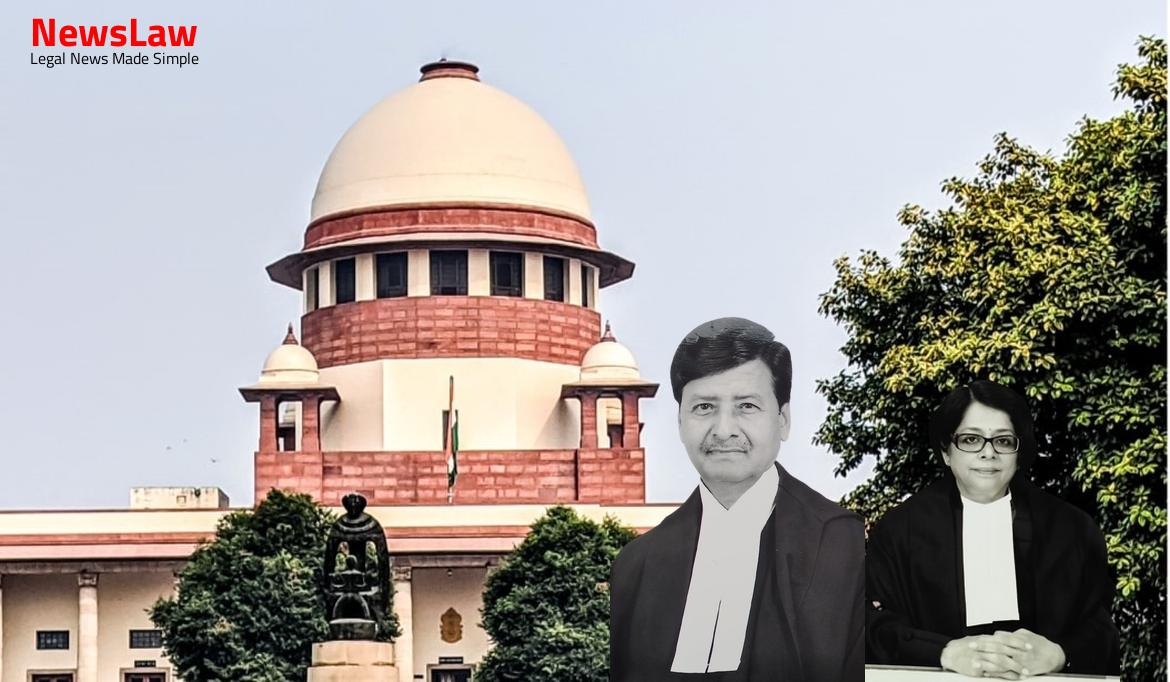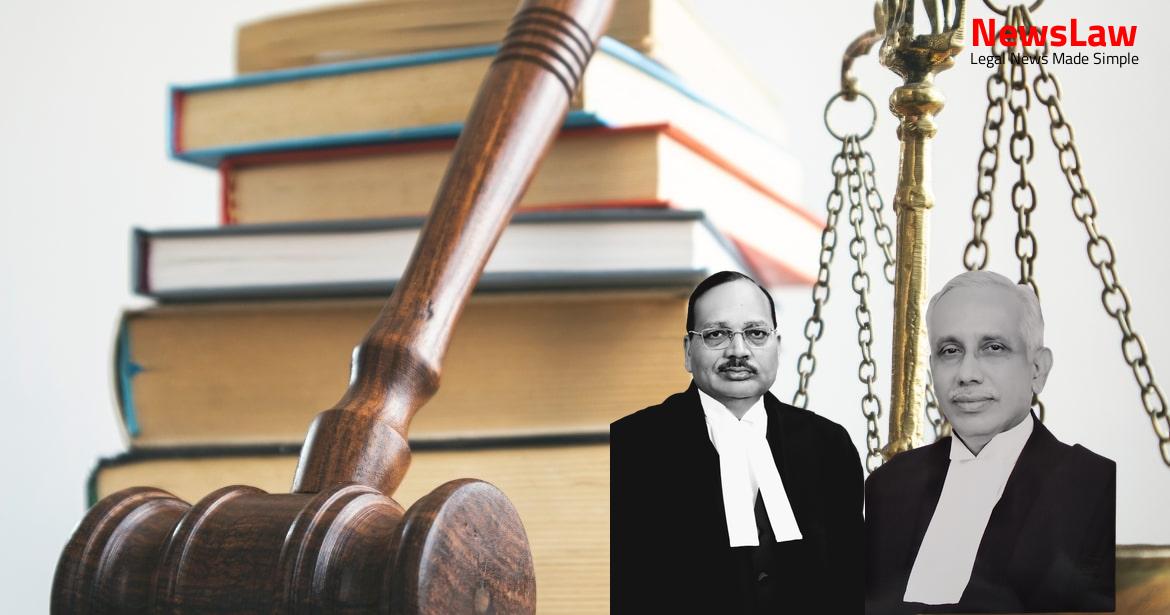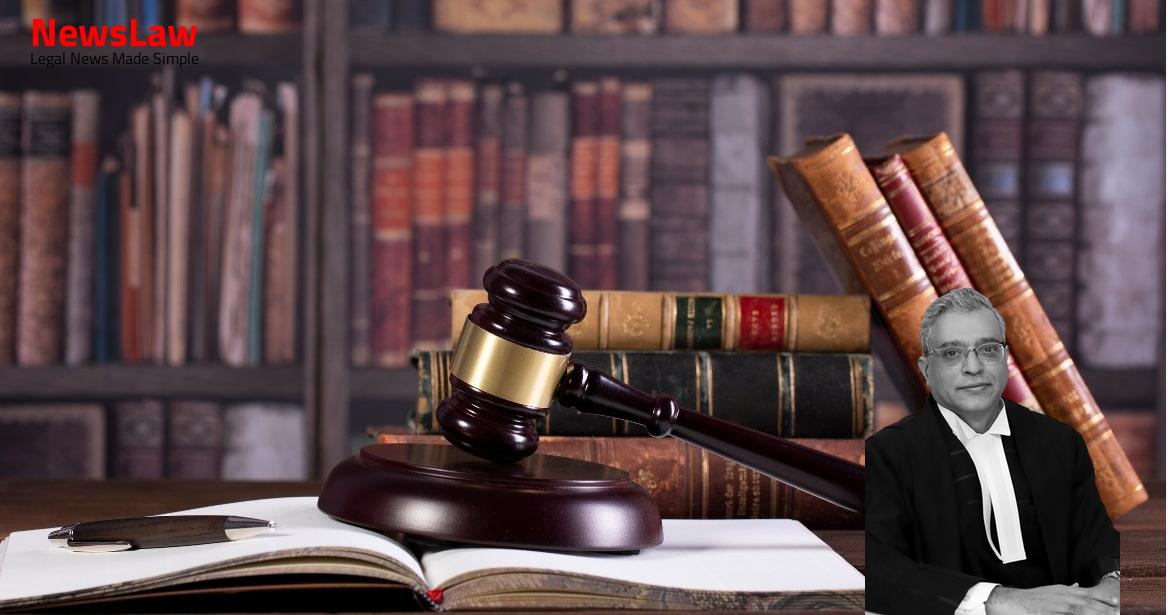Delve into the realm of legal intricacies as the court’s judgment on quashing criminal proceedings unfolds. The case involves a detailed examination of inherent powers under Section 482 CrPC, showcasing the importance of upholding legal principles in complex matters. Stay tuned to uncover the essence of the court’s legal analysis in this riveting case.
Facts
- The property in question was alleged to be sub-divided, which was not permitted as per the Master Plan Delhi, 2021.
- Prior to the present transaction, the 2nd respondent had forfeited a sum of Rs. 18 crores from the same property in a previous transaction in 2007.
- The role of the 2nd respondent’s husband is under investigation, and a supplementary charge-sheet may be filed if adverse material is found.
- The 2nd respondent challenged the orders passed in revision petition before the High Court under Section 482 CrPC.
- A charge-sheet was filed under Sections 420, 406, and 34 IPC against the 2nd respondent.
- The agreement to sell was executed between the 2nd respondent and the 1st appellant on 24 December 2011.
- A private complaint was filed under Section 200 read with Section 190 CrPC, leading to the registration of FIR against the 2nd respondent and broker under Sections 420, 406, and 34 IPC.
- The 1st appellant paid a sum of Rs. 12.50 crores at the time of execution of the agreement to sell.
- The court quashed all criminal proceedings and orders dated 15 November, 2016 and 24 April, 2017.
- The observations made in the judgment should not be seen as an expression on the merits of the arbitration proceedings.
- The impugned judgment was dated 15 March, 2019.
Also Read: Legal Case: Sentence Reduction in Non-Compoundable Offence
Arguments
- Mr. Mukul Rohatgi, senior counsel for the appellants, argued that the charge-sheet filed by the Investigating Officer establishes the commission of offences under Sections 406, 420, and 34 IPC by the 2nd respondent.
- The learned Judge of the High Court was mentioned to have received a copy of the charge-sheet on 9 October, 2018, yet did not reference it in the judgment quashing the criminal proceedings.
- It was contended that the exercise of inherent power under Section 482 CrPC by the High Court is exceptional and the court erred by ignoring crucial facts on record in its decision.
- The learned Additional Sessions Judge had found no flaw in the order taking cognizance of the case, unlike the High Court which allegedly failed to properly analyze the facts and concluded that the matter was a civil dispute beyond criminal jurisdiction.
- The argument presented was that the basis of the High Court’s decision was unsustainable in law and therefore should be set aside.
- Multiple judgments of the Supreme Court were cited in support of the submissions.
- Mr. P. Chidambaram, senior counsel for the 2nd respondent, countered by emphasizing the details of the agreement to sell, the termination of the agreement due to the appellant’s failure to comply, and the initiation of arbitral proceedings.
- It was asserted that the agreement to sell did not amount to an offence under Section 420 IPC.
- Learned counsel for the 2 respondent has justified that all conditions of the agreement were fulfilled and documentary evidence supports it.
- Counsel for the 2 respondent cited various judgments of this Court supporting the exercise of inherent powers under Section 482 CrPC by the High Court to set aside criminal proceedings in civil dispute cases.
- An IA has been filed by the 2 respondent for initiating proceedings under Section 340 read with Section 195 CrPC against the appellants for alleged concealment of documents and false statements.
- The High Court is not obligated to critically examine the complaint/FIR/charge-sheet at the Section 482 CrPC stage, only the prima facie appearance of the offence is considered.
- The 2 respondent argues that the case is a civil dispute as earnest money was forfeited when the 1 appellant failed to perform the terms of the agreement. Criminal proceedings were initiated to harass the respondent.
- The 2 respondent contends that no offence under Section 406 is made out as the earnest money was paid as per the contract terms without any restriction on its utilization.
- The 1 appellant is accused of suppressing the fact that she did not receive a letter dated 28 February, 2012 sent by the 2 respondent.
Also Read: Recovery of Misappropriated Temple Funds: Court’s Legal Analysis
Analysis
- Arbitration is a remedy in case of breach of agreement but cannot conduct a trial for an act amounting to an offense.
- Initiation of arbitral proceedings is not correlated with criminal proceedings.
- Investigating agencies should have the freedom to go into allegations unless it’s mala fide initiation for private vengeance.
- Criminal proceedings can be quashed in exceptional cases of mala fide initiation or when no cognizable offense is disclosed.
- Criminal proceedings can be quashed if allegations are absurd, legally barred, or manifestly mala fide.
- The High Court must exercise inherent powers cautiously and consider if the continuation of proceedings is an abuse of court process.
- The exercise of inherent powers should not override the detailed procedure laid out in the Criminal Procedure Code.
- The High Court needs to carefully assess if the complaint discloses the commission of an offense before quashing proceedings.
- Allegations in a complaint must be proven during the trial, and civil remedies do not override criminal proceedings for offenses.
- The rarest of rare cases must be established for the High Court to intervene and quash criminal proceedings.
- Allegations of cheating in commercial transactions fall under IPC Sections 415, 418, and 420.
- In analyzing complaints, the High Court must ensure the allegations make out an offense, and decisions should rely on trial evidence.
- The High Court should refrain from prematurely halting criminal proceedings before trial evidence is presented.
- The case involves a criminal offence under Sections 420, 406, and 34 of the IPC committed by the 2 respondent.
- The parties had entered into an agreement to sell, which is considered a purely commercial transaction.
- In case of a breach of the terms of the agreement, the party was justified in forfeiting the earnest money.
- This situation is seen as a civil dispute rather than a criminal offence.
- The allegations in the FIR do not disclose a cognizable offence that would justify police investigation under Section 156(1) of the Code.
- High Court’s inherent jurisdiction under Section 482 CrPC to prevent abuse of process of any court or to secure ends of justice.
- It can be exercised to quash criminal proceedings or FIR that are prima facie abuse of the process of court.
- Guidelines laid down in Bhajan Lal case for exercise of inherent jurisdiction.
- Courts should ensure that frivolous or vexatious cases are quashed, but genuine cases should not be thwarted.
- The provision for referring disputes to arbitration in an agreement is not an effective substitute for criminal prosecution when the disputed act is an offense.
- Pre-emption of investigation can be justified only in extreme cases, as indicated in the case of State of Haryana v. Bhajan Lal [1992 Supp (1) SCC 335].
- Applications filed for ulterior reasons are disapproved.
- Sufficient material in the record connects the 2nd respondent to the crime.
- There is no need to remit the matter back as it will delay the proceedings.
- Initiation of criminal proceedings against the 1st appellant under Section 340 read with Section 195 CrPC at the conclusion of the proceedings.
- High Court did not consider the charge-sheet against 2nd respondent.
- Submission that the termination was due to breach of contract and a civil dispute is not valid for quashing criminal proceedings.
- 2nd respondent’s defense can be presented during the trial, not for quashing under Section 482 CrPC.
- The matter cannot be remitted back to the High Court for re-consideration based on the charge-sheet and other available material.
Also Read: Determining Seniority in Delayed Appointments: Legal Analysis
Decision
- The appeal has succeeded and is allowed.
- The observations made in the judgment are only for the purpose of disposal of the present appeal.
- The trial court is directed to proceed with the trial expeditiously without being influenced by the observations in this judgment or considering them as an expression of the judges’ opinions.
- The judgment of the High Court dated 15 March, 2019 has been set aside.
- The said IA (specific reference) is dismissed.
Case Title: PRITI SARAF Vs. STATE OF NCT OF DELHI (2021 INSC 177)
Case Number: Crl.A. No.-000296-000296 / 2021



